鉴赏艾米丽·迪金森的《我是无名之辈.你是谁?》
Emily_Dickinson诗歌赏析
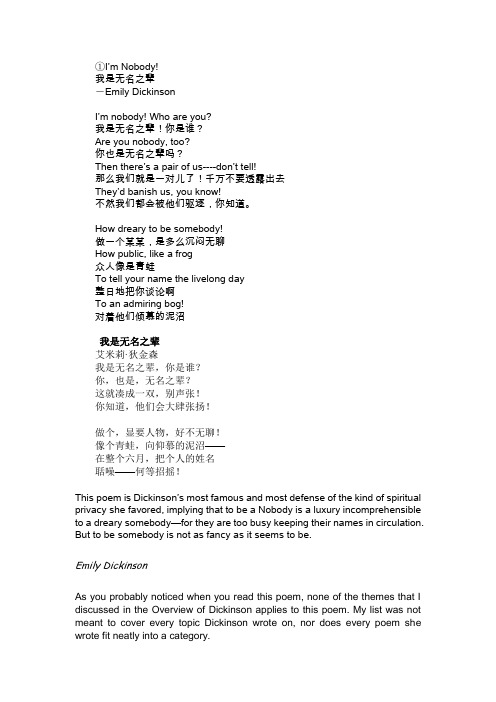
①I’m Nobody!我是无名之辈-Emily DickinsonI’m nobody! Who are you?我是无名之辈!你是谁?Are you nobody, too?你也是无名之辈吗?Then there’s a pair of us----don’t tell!那么我们就是一对儿了!千万不要透露出去They’d banish us, you know!不然我们都会被他们驱逐,你知道。
How dreary to be somebody!做一个某某,是多么沉闷无聊How public, like a frog众人像是青蛙To tell your name the livelong day整日地把你谈论啊To an admiring bog!对着他们倾慕的泥沼我是无名之辈艾米莉·狄金森我是无名之辈,你是谁?你,也是,无名之辈?这就凑成一双,别声张!你知道,他们会大肆张扬!做个,显要人物,好不无聊!像个青蛙,向仰慕的泥沼——在整个六月,把个人的姓名聒噪——何等招摇!This poem is Dickinson’s most famous and most defense of the kind of spiritual privacy she favored, implying that to be a Nobody is a luxury incomprehensible to a dreary somebody—for they are too busy keeping their names in circulation. But to be somebody is not as fancy as it seems to be.Emily DickinsonAs you probably noticed when you read this poem, none of the themes that I discussed in the Overview of Dickinson applies to this poem. My list was not meant to cover every topic Dickinson wrote on, nor does every poem she wrote fit neatly into a category.Dickinson adopts the persona of a child who is open, naive, and innocent. However, are the questions asked and the final statement made by this poem naive? If they are not, then the poem is ironic because of the discrepancy between the persona's understanding and view and those of Dickinson and the reader. Under the guise of the child's accepting society's values, is Dickinson really rejecting those values?Is Dickinson suggesting that the true somebody is really the "nobody"? The child-speaker welcomes the person who honestly identifies herself and who has a true identity. These qualities make that person "nobody" in society's eyes. To be "somebody" is to have status in society; society, the majority, excludes or rejects those who lack status or are "nobody"--that is, "they'd banish us" for being nobody.In stanza 2, the child-speaker rejects the role of "somebody" ("How dreary"). The frog comparison depicts "somebody" as self-important and constantly self-promoting. She also shows the false values of a society (the "admiring bog") which approves the frog-somebody. Does the word "bog" (it means wet, spongy ground) have positive or negative connotations? What qualities are associated with the sounds a frog makes (croaking)?Is there satire in this poem?Some readers, who are modest and self-effacing or who lack confidence, feel validated by this poem. Why?②To Make a Prairie…To make a prairieIt takes a clover and one bee,One clover and a bee,And revery.Revery alone will do,If bees are few.去造一个草原张祈试译去造一个草原需要一株三叶草和一只蜜蜂,一株三叶草和一只蜜蜂,还有梦。
i'm nobody 诗歌汉译
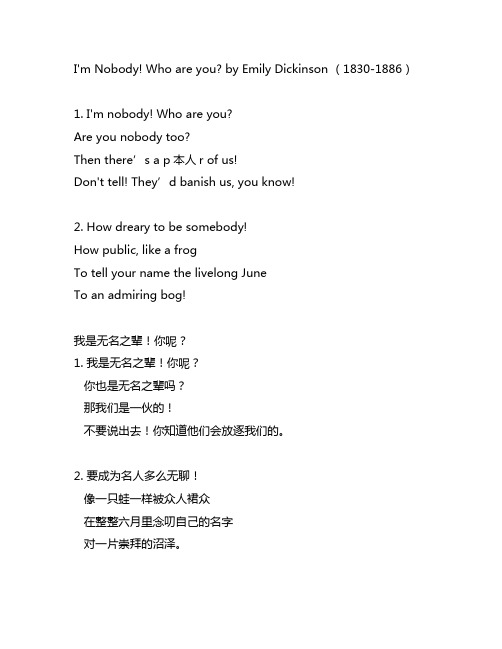
I'm Nobody! Who are you? by Emily Dickinson (1830-1886)1. I'm nobody! Who are you?Are you nobody too?Then there’s a p本人r of us!Don't tell! They’d banish us, you know!2. How dreary to be somebody!How public, like a frogTo tell your name the livelong JuneTo an admiring bog!我是无名之辈!你呢?1. 我是无名之辈!你呢?你也是无名之辈吗?那我们是一伙的!不要说出去!你知道他们会放逐我们的。
2. 要成为名人多么无聊!像一只蛙一样被众人裙众在整整六月里念叨自己的名字对一片崇拜的沼泽。
以上是美国诗人艾米莉·狄金森所作诗歌《我是无名之辈》的原文,以下为该诗的汉译:我是无名之辈!你呢?——艾米莉·狄金森1. 我是无名之辈!你呢?你也是无名之辈吗?那我们是一伙的!不要告诉他们!他们会把我们放逐。
2. 成为名人多么无聊!像蛙一样公开地在整整六月里对着仰慕的泥塘说出自己的名字。
这首诗简短而富有内涵,表达了诗人对于平凡的认同和对名利的厌倦之情。
通过对诗歌的汉译,我们也可以更加深入地理解诗意所在。
在第一节中,诗人通过对“无名之辈”的自我认同,暗示了对于平凡生活的接纳和渴望找到知己的心情。
她也警示了“不要告诉他们”,即不要向社会展现自己的真实面目,以免被排挤和孤立。
而第二节则明确表达了诗人对于成为名人和备受瞩目的反感之情,她将之形象地比喻为“公开地在整整六月里告诉泥塘自己的名字”,充满了对于世俗名利的鄙视和对于宁静平淡生活的向往。
在这首诗中,艾米莉·狄金森用简练而雄辩的语言,表达了自己对于平凡的理解和对于名利的厌倦之情,以及对于自由和隐秘生活的向往。
i am nobody who are you赏析
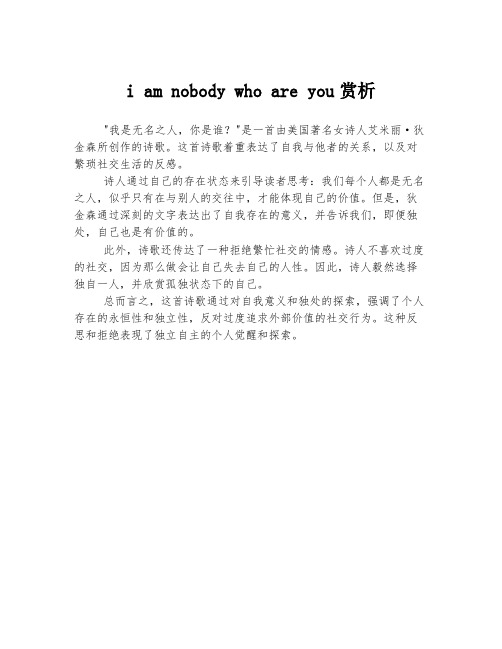
i am nobody who are you赏析
"我是无名之人,你是谁?"是一首由美国著名女诗人艾米丽·狄金森所创作的诗歌。
这首诗歌着重表达了自我与他者的关系,以及对繁琐社交生活的反感。
诗人通过自己的存在状态来引导读者思考:我们每个人都是无名之人,似乎只有在与别人的交往中,才能体现自己的价值。
但是,狄金森通过深刻的文字表达出了自我存在的意义,并告诉我们,即便独处,自己也是有价值的。
此外,诗歌还传达了一种拒绝繁忙社交的情感。
诗人不喜欢过度的社交,因为那么做会让自己失去自己的人性。
因此,诗人毅然选择独自一人,并欣赏孤独状态下的自己。
总而言之,这首诗歌通过对自我意义和独处的探索,强调了个人存在的永恒性和独立性,反对过度追求外部价值的社交行为。
这种反思和拒绝表现了独立自主的个人觉醒和探索。
英语学习资料:艾米莉经典英文诗:我是无名之辈
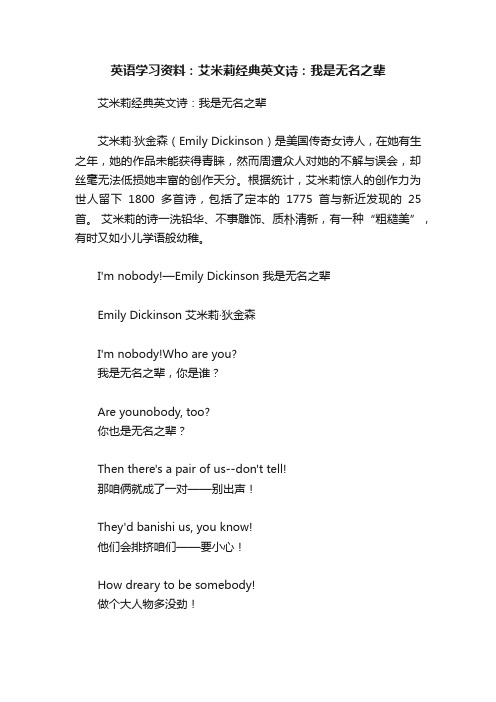
英语学习资料:艾米莉经典英文诗:我是无名之辈
艾米莉经典英文诗:我是无名之辈
艾米莉·狄金森(Emily Dickinson)是美国传奇女诗人,在她有生之年,她的作品未能获得青睐,然而周遭众人对她的不解与误会,却丝毫无法低损她丰富的创作天分。
根据统计,艾米莉惊人的创作力为世人留下1800多首诗,包括了定本的1775首与新近发现的25首。
艾米莉的诗一洗铅华、不事雕饰、质朴清新,有一种“粗糙美”,有时又如小儿学语般幼稚。
I'm nobody!—Emily Dickinson 我是无名之辈
Emily Dickinson 艾米莉·狄金森
I'm nobody!Who are you?
我是无名之辈,你是谁?
Are younobody, too?
你也是无名之辈?
Then there's a pair of us--don't tell!
那咱俩就成了一对——别出声!
They'd banishi us, you know!
他们会排挤咱们——要小心!
How dreary to be somebody!
做个大人物多没劲!
How public, like a frog,
多招摇——像只青蛙
To tell your name the livelong day,对着欣赏的小水洼
To an admiring bog!
整日里炫耀自己的名号!。
emilydickinson诗歌赏析

①I’m Nobody!我是无名之辈-Emily DickinsonI’m nobody! Who are you我是无名之辈!你是谁Are you nobody, too你也是无名之辈吗Then there’s a pair of us----don’t tell!那么我们就是一对儿了!千万不要透露出去They’d banish us, you know!不然我们都会被他们驱逐,你知道。
How dreary to be somebody!做一个某某,是多么沉闷无聊How public, like a frog众人像是青蛙To tell your name the livelong day整日地把你谈论啊To an admiring bog!对着他们倾慕的泥沼我是无名之辈艾米莉·狄金森我是无名之辈,你是谁你,也是,无名之辈这就凑成一双,别声张!你知道,他们会大肆张扬!做个,显要人物,好不无聊!像个青蛙,向仰慕的泥沼——在整个六月,把个人的姓名聒噪——何等招摇!This poem is Dickinson’s most famous and most defense of the kind of spiritual privacy she favored, implying that to be a Nobody is a luxury incomprehensible to a dreary somebody—for they are too busy keeping their names in circulation. But to be somebody is not as fancy as it seems to be.Emily DickinsonAs you probably noticed when you read this poem, none of the themes that I discussed in the Overview of Dickinson applies to this poem. My list was not meant to cover every topic Dickinson wrote on, nor does every poem she wrote fit neatly into a category.Dickinson adopts the persona of a child who is open, naive, and innocent. However, are the questions asked and the final statement made by this poem naive If they are not, then the poem is ironic because of the discrepancy between the persona's understanding and view and those of Dickinson and the reader. Under the guise of the child's accepting society's values, is Dickinson really rejecting those valuesIs Dickinson suggesting that the true somebody is really the "nobody" The child-speaker welcomes the person who honestly identifies herself and who has a true identity. These qualities make that person "nobody" in society's eyes. To be "somebody" is to have status in society; society, the majority, excludes or rejects those who lack status or are "nobody"--that is, "they'd banish us" for being nobody.In stanza 2, the child-speaker rejects the role of "somebody" ("How dreary"). The frog comparison depicts "somebody" as self-important and constantly self-promoting. She also shows the false values of a society (the "admiring bog") which approves the frog-somebody. Does the word "bog" (it means wet, spongy ground) have positive or negative connotations What qualities are associated with the sounds a frog makes (croaking)Is there satire in this poemSome readers, who are modest and self-effacing or who lack confidence, feel validated by this poem. Why②To Make a Prairie…To make a prairieIt takes a clover and one bee,One clover and a bee,And revery.Revery alone will do,If bees are few.去造一个草原张祈试译去造一个草原需要一株三叶草和一只蜜蜂,一株三叶草和一只蜜蜂,还有梦。
我是无名之辈诗歌赏析
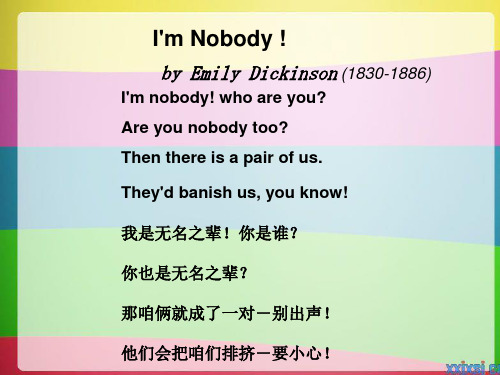
Comments:
1.It is a common mistake of people to say Emily Dickinson was secluded from the world and reflected this through her poetry. On the contrary, Dickinson tried very hard to publish her work but never succeeded. Not to say she was a social person, or "somebody," as she referred to people’s thought to be important in this poem, but she did ask many newspaper people and other companies to inform the world of her magnificent and deep poetry, but never had her poetry published. Her poetry is very misleading in this area. Emily wrote poems that expressed feelings of loneliness or seclusion. So, many concluded that because her work was never published, and because most of her poems are of sadness, she must be lonely and never tried to do anything to enlighten the world of her poetry. This common misconception had led many to believe "facts" in documentaries on her which, in fact, are just inferences.
i am nobody who are you诗歌鉴赏
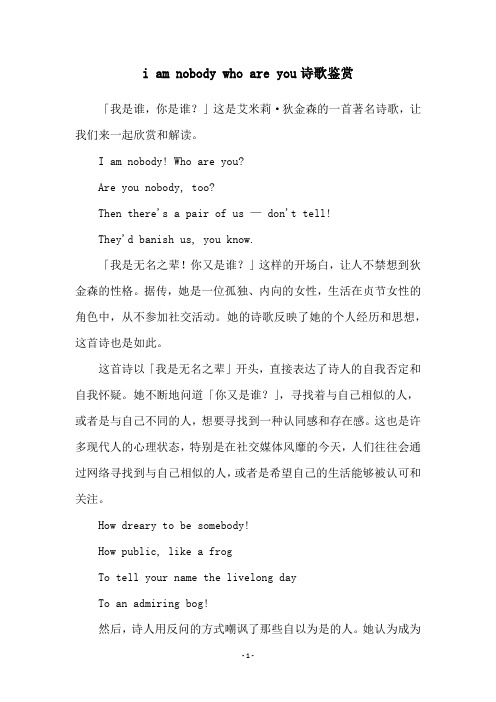
i am nobody who are you诗歌鉴赏「我是谁,你是谁?」这是艾米莉·狄金森的一首著名诗歌,让我们来一起欣赏和解读。
I am nobody! Who are you?Are you nobody, too?Then there's a pair of us — don't tell!They'd banish us, you know.「我是无名之辈!你又是谁?」这样的开场白,让人不禁想到狄金森的性格。
据传,她是一位孤独、内向的女性,生活在贞节女性的角色中,从不参加社交活动。
她的诗歌反映了她的个人经历和思想,这首诗也是如此。
这首诗以「我是无名之辈」开头,直接表达了诗人的自我否定和自我怀疑。
她不断地问道「你又是谁?」,寻找着与自己相似的人,或者是与自己不同的人,想要寻找到一种认同感和存在感。
这也是许多现代人的心理状态,特别是在社交媒体风靡的今天,人们往往会通过网络寻找到与自己相似的人,或者是希望自己的生活能够被认可和关注。
How dreary to be somebody!How public, like a frogTo tell your name the livelong dayTo an admiring bog!然后,诗人用反问的方式嘲讽了那些自以为是的人。
她认为成为「某个人」是多么无聊,就像是把自己变成了一只青蛙,在池塘中自吹自擂,让周围的青蛙都向自己投来羡慕的目光。
这里的青蛙可能比喻一些社交媒体上的名人或者是自以为是的人,他们为了得到关注和认可,不停地晒出自己的生活、自己的成就。
但是这种表现往往只是一种虚假的存在感,因为真正的存在感不是来自于别人的赞美和关注,而是来自于自己的内心认可和自我价值的体现。
总之,这首诗表达了诗人的孤独和自我怀疑,也反映了社交媒体时代的一种心理状态。
通过这首诗的鉴赏,我们也可以反思自己的生活和内心,找到真正的存在感和自我价值。
I27m Nobody赏析.doc

I27m Nobody赏析.doc《我是无名氏》(I'm Nobody! Who are you?)是美国诗人艾米莉·狄金森的一首美丽的诗歌。
艾米莉·狄金森以其独特而纯粹的思想和语言风格备受推崇。
这首诗是她的代表作之一。
这篇文章将从诗的背景、主题和情感等方面进行详细的分析和评论。
一、诗歌背景艾米莉·狄金森生于1830年,是美国十九世纪末著名的女诗人之一,她的诗作在当时并不被人们所重视,直到墨子出版社于1955年将她的大量诗歌集成出版后,艾米莉·狄金森才被广泛知晓。
这首诗是她创作的一首自传诗。
这首诗在她的创作中是比较典型和重要的,反映出她孤独、隐退和独立自主的内心世界。
二、诗歌主题1. 渴望平凡这首诗讲述了主人公渴望平凡,不愿意接受世俗的标签、掌声和关注。
主人公喜欢独自一人,认为自己和路人没有什么区别。
在这里,主人公明确表明自己不想受到世俗的影响,不愿成为众人眼中的焦点和英雄。
相反,主人公渴望平淡和幸福,享受独处的自由。
2. 恐惧孤独尽管主人公对独处有所追求,但同时也表现出对孤独的恐惧。
在第二段中,主人公说:“你也许是一个‘Nobody’——就我而言,这是太孤独的一种存在。
”这一句表明了主人公对独处的担忧和矛盾。
即使她渴望独处,她也害怕成为“空气”,被世人遗忘。
3. 欣赏真正的美诗中的主人公亦表现出一种独立、自由、真诚、敏感和纯洁的人格特征。
主人公渴望在现实中寻找真正的连接和联系,而不是掩饰自己或试图成为别人想象中的样子。
她欣赏真正的美,而不是虚假的、充满世俗虚荣心的事物。
三、情感表达这首诗是一首简洁、真诚和直率的作品,作者通过它表达了自己感觉到的各种情感。
主人公渴望平凡和独处的情感表达了她对现实世界的不满和对独立自主的渴望。
她内心深处的矛盾,即对独处的担心和渴望孤独,使她显得更为真实和可信。
作者的渴望平凡和另一个Nobody的交流也表达了她对真正连接和理解的渴望。
- 1、下载文档前请自行甄别文档内容的完整性,平台不提供额外的编辑、内容补充、找答案等附加服务。
- 2、"仅部分预览"的文档,不可在线预览部分如存在完整性等问题,可反馈申请退款(可完整预览的文档不适用该条件!)。
- 3、如文档侵犯您的权益,请联系客服反馈,我们会尽快为您处理(人工客服工作时间:9:00-18:30)。
鉴赏艾米丽迪金森的《我是无名之辈.你是谁?》
余娟;田明刚
【期刊名称】《海外英语》
【年(卷),期】2016(000)022
【摘要】美国著名女诗人艾米丽·迪金森的诗歌,《我是无名之辈.你是谁?》一直以其独特的魅力吸引着许多学者从不同视角,比如说:文体学、接受美学、音乐学、语言学、翻译学等角度,剖析出此诗不同层次的涵义。
该文将从文学鉴赏的角度出发,分析作者与读者的创作与阅读心理。
【总页数】1页(P154-154)
【作者】余娟;田明刚
【作者单位】赣南师范大学外国语学院;赣南师范大学外国语学院
【正文语种】中文
【中图分类】I712.072
【相关文献】
1.走向反符号主义:艾米丽·狄金森诗歌《我是无名之辈浴你是谁钥》的符号式解读 [J],
2.鉴赏艾米丽·迪金森的《我是无名之辈!你是谁?》 [J], 余娟;田明刚
3.概念隐喻视角下艾米丽·迪金森诗歌中的爱情观——以《我不能停下等待死亡》为例 [J], 李琳;格根;
4.艾米丽·迪金森爱情诗歌中的矛盾性 [J], 赵东霞;王淑
5.从艾米丽·迪金森的诗歌 A narrow Fellow in the Grass 看前景化的翻译 [J], 张云丹
因版权原因,仅展示原文概要,查看原文内容请购买。
